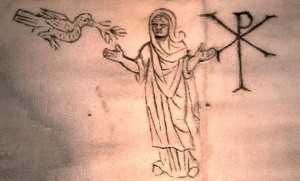Is This An Authentic Work of the Holy Spirit?
 If you have read my previous articles, then I hope you are becoming convinced that what Christians think about the Holy Spirit really does matter.
If you have read my previous articles, then I hope you are becoming convinced that what Christians think about the Holy Spirit really does matter.
But perhaps you are wondering, “What’s all this fuss about the Holy Spirit?” We do, after all, identify ourselves as Christ-ians or followers of Christ. Shouldn’t our attention be focused on Jesus, on trusting, following and imitating him?
The Bible tells us a whole lot about Jesus. The story of his life is told four times by four different gospel writers, and the events of the gospels are thoroughly interpreted and explained in the Epistles.
By comparison, the Bible says much less about the Holy Spirit, and he is difficult to pin down. The Spirit is mysterious, unpredictable, and beyond our human understanding.
The Holy Spirit: Does What We Know About Him Actually Matter? (Part 4)
 Beneath the surface, Christians have many unofficial, unstated, and untested notions about the Holy Spirit that profoundly impact their spirituality. These ideas casually spread from one person to another and become a de facto orthodoxy, a set of positions that are rarely taught in any systematic way, but are nevertheless deeply embedded in the collective psyche of a church.
Beneath the surface, Christians have many unofficial, unstated, and untested notions about the Holy Spirit that profoundly impact their spirituality. These ideas casually spread from one person to another and become a de facto orthodoxy, a set of positions that are rarely taught in any systematic way, but are nevertheless deeply embedded in the collective psyche of a church.
In this article, I will try to uncover some of these assumptions and demonstrate that they really do matter. Try asking yourself the following questions.
1. How does the Holy Spirit bring about personal holiness? Does he usually (a) take away our inclination to sin and make us want to obey God, or (b) expect us to struggle against the sinful nature, perhaps helping us out from time to time, until we overcome temptation and experience victory?
Beware of the Tiger Mom
 For the last few weeks, the internet has been abuzz with talk of the Tiger Mom.
For the last few weeks, the internet has been abuzz with talk of the Tiger Mom.
Amy Chua, a professor at Yale University and mother of two daughters, ignited a firestorm with her opinion piece in the Wall Street Journal, “Why Chinese Mothers are Superior.” Chua uses the term “Chinese mothers” to describe an ultra-strict parenting style which is prevalent among Asian-American immigrants. She described how she never allows her daughters to attend sleepovers, have playdates with other children, watch TV or play computer games. She does not allow them to get any grade less than an A. She expects them to be the number 1 student in every class, except gym and drama. She forces them — using physical restraint if necessary — to put in long hours of practicing piano and violin. Any sign of disrespect toward their parents is met with swift and severe punishment. She described how her own father once became angry at her and called her “garbage” in his Chinese dialect, and she has done this to her own daughters as well. While western parents are horrified by this, thinking that it damages the child’s self-esteem, she believes that it can be healthy, productive and useful. She regards this parenting style as superior because it leads to achievement and success, ultimately allowing the children to experience the joys of accomplishment. She defends her practices as an expression of motherly love.
Are You A True Friend?
 The Social Network has recently won the Golden Globes award for Best Picture Drama, and it might also win the Academy Award for Best Picture of 2010. This film is about Mark Zuckerberg, a computer genius who, at 26 years of age, the youngest billionaire in the world. It tells the story of how he started Facebook when he was a student at Harvard University in 2004.
The Social Network has recently won the Golden Globes award for Best Picture Drama, and it might also win the Academy Award for Best Picture of 2010. This film is about Mark Zuckerberg, a computer genius who, at 26 years of age, the youngest billionaire in the world. It tells the story of how he started Facebook when he was a student at Harvard University in 2004.
This movie made me think about friendship. The story focuses on Zuckerberg’s relationships with four young men: his best friend, Edwardo Severin, who was the co-founder of Facebook, and three rich Harvard students. Their friendships with Zuckerberg broke down, and all four eventually sued him for huge sums of money.
The Holy Spirit: Does What We Know About Him Actually Matter? (Part 3)
 If you are a Christian, then you ought to call the Holy Spirit “he” rather than “it.” The Spirit is not an invisible power or force, but a person who thinks, feels, communicates and decides.
If you are a Christian, then you ought to call the Holy Spirit “he” rather than “it.” The Spirit is not an invisible power or force, but a person who thinks, feels, communicates and decides.
And you ought to agree that the Holy Spirit is God. On that point, Scripture is very clear. For example, in Acts 5:3, Peter said, “Ananias,… you have lied to the Holy Spirit.” One verse later, Peter adds, “You have not lied to men but to God.”
"May God Make America a Kingdom of Priests and a Holy Nation!"
 I have been thinking lately about a question that has plagued me since I first came to UBF in 1999: What does the prayer “May God make America a Kingdom of Priests and a Holy Nation” actually mean?
I have been thinking lately about a question that has plagued me since I first came to UBF in 1999: What does the prayer “May God make America a Kingdom of Priests and a Holy Nation” actually mean?
When I asked older shepherds this question, I got different answers every time. Of course, I wholeheartedly shouted this prayer slogan every time Pastor Ron asked the congregation to do so. But in the back of my mind, there was a lingering question about what I was actually praying for.
The Holy Spirit: Does What We Know About Him Actually Matter? (Part 2)
 In the last post, I argued that the Holy Spirit plays an indispensible role in our understanding of the gospel. We see abundant evidence for this in Scripture. And we see abundant evidence in the history of the Church.
In the last post, I argued that the Holy Spirit plays an indispensible role in our understanding of the gospel. We see abundant evidence for this in Scripture. And we see abundant evidence in the history of the Church.
One defining moment in Christian history came in 1054 A.D. in an event known as the Great Schism, when the Church split into Eastern (Orthodox) and Western (Roman Catholic) branches. The tension between these camps had been building for some time. It was exacerbated by poor communication between leaders from the East who spoke Greek and those from the West who spoke Latin. But the immediate issue that caused these tensions to flare was a seemingly obscure argument about the Holy Spirit known as the filioque controversy.
The Holy Spirit: Does What We Know About Him Actually Matter? (Part 1)
 The importance, nature and work of the Holy Spirit are not well understood by many Christians today. And in that category, I definitely include myself.
The importance, nature and work of the Holy Spirit are not well understood by many Christians today. And in that category, I definitely include myself.
Since my college days, I have belonged to a non-denominational church that emphasizes textual Bible study, prayer and evangelism. Over the years, we have constantly spoken of God and Jesus, and in passing we have often mentioned the Holy Spirit. We formally uphold the doctrine of the Trinity. But in-depth discussion of the Holy Spirit has been rare.
As far as I can tell, my experience is common among evangelical Christians, especially those of the non-Pentecostal variety. The implicit message seems to be: If you believe that Christ died for your sins, that is enough to make you a real Christian. But is it enough?
Who Is Our Worship Service For?
 Having been a faithful UBF worship service attendee for almost 30 years, I have seen all kinds of reactions to our worship services. I have seen people being moved and edified. And I have seen newcomers sitting in the service and shaking their heads and leaving early because they couldn’t stand it. I have seen other newcomers laughing at and ridiculing us as we were worshiping. I have seen people coming in just once and never ever showing up again.
Having been a faithful UBF worship service attendee for almost 30 years, I have seen all kinds of reactions to our worship services. I have seen people being moved and edified. And I have seen newcomers sitting in the service and shaking their heads and leaving early because they couldn’t stand it. I have seen other newcomers laughing at and ridiculing us as we were worshiping. I have seen people coming in just once and never ever showing up again.
So I grew up with the notion that worship service must be the weirdest thing on earth for people who are unaccustomed to it. Perhaps it is. But why is that the case? And who is the worship service really for?
Overcoming the Male-Dominated Culture of UBFriends
 When this website was launched in the summer of 2010, we had a grandiose vision of a cyber-cafe where people of many different backgrounds could meet and connect with one another. A safe haven where we could discuss all sorts of issues pertinent to UBF and to life beyond. A place where new friendships would form and grow.
When this website was launched in the summer of 2010, we had a grandiose vision of a cyber-cafe where people of many different backgrounds could meet and connect with one another. A safe haven where we could discuss all sorts of issues pertinent to UBF and to life beyond. A place where new friendships would form and grow.
That has happened. God has blessed us with lots of interesting articles and lively discussion. Even during the recent holiday period, when our pace of publishing slowed down to less than one new article per week, we were still averaging about 50 site visits per day by readers from all over the world.
But one aspect of UBFriends has been gnawing at my conscience: the overwhelming majority of posts and comments have been written by males.

Last 30 Comments